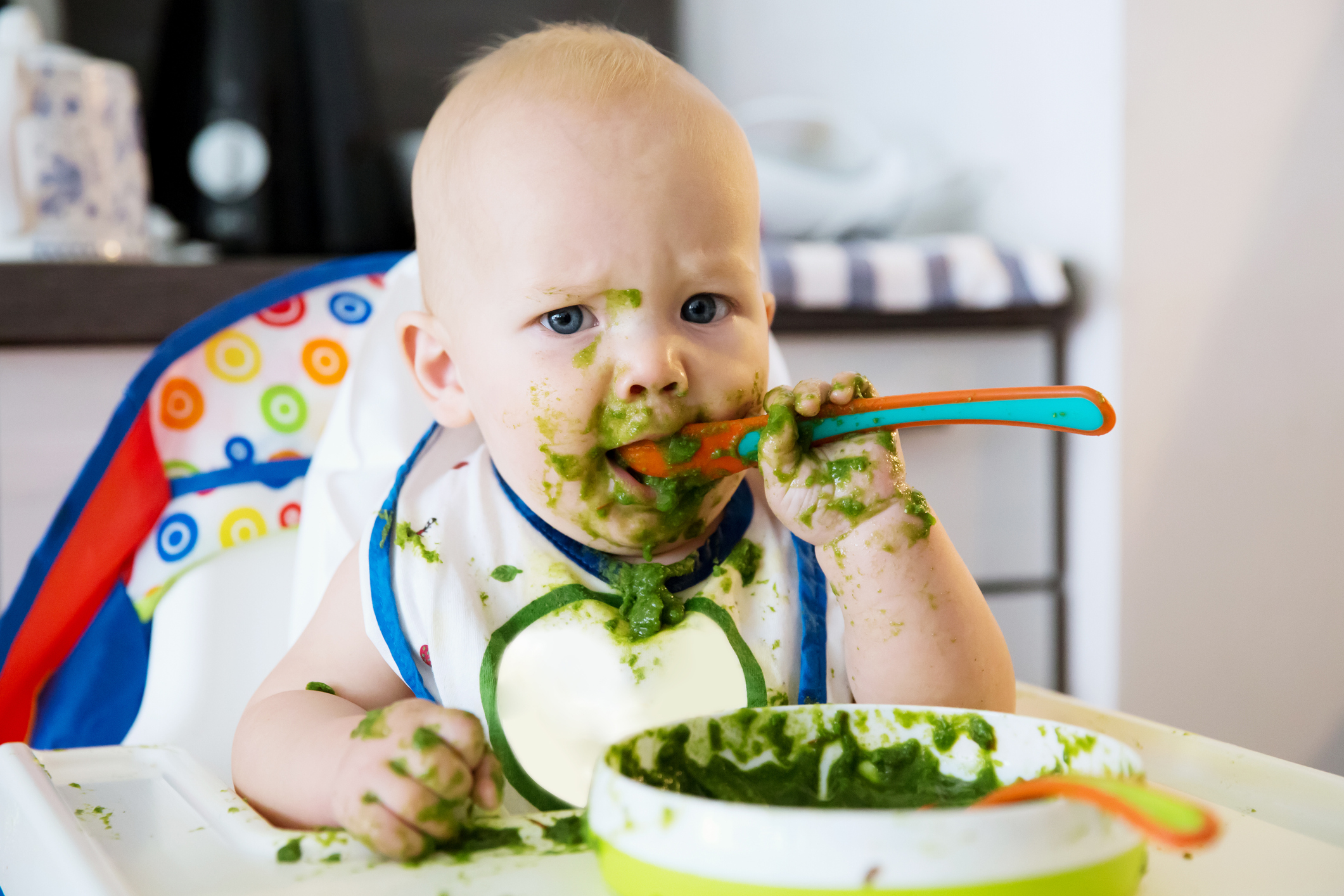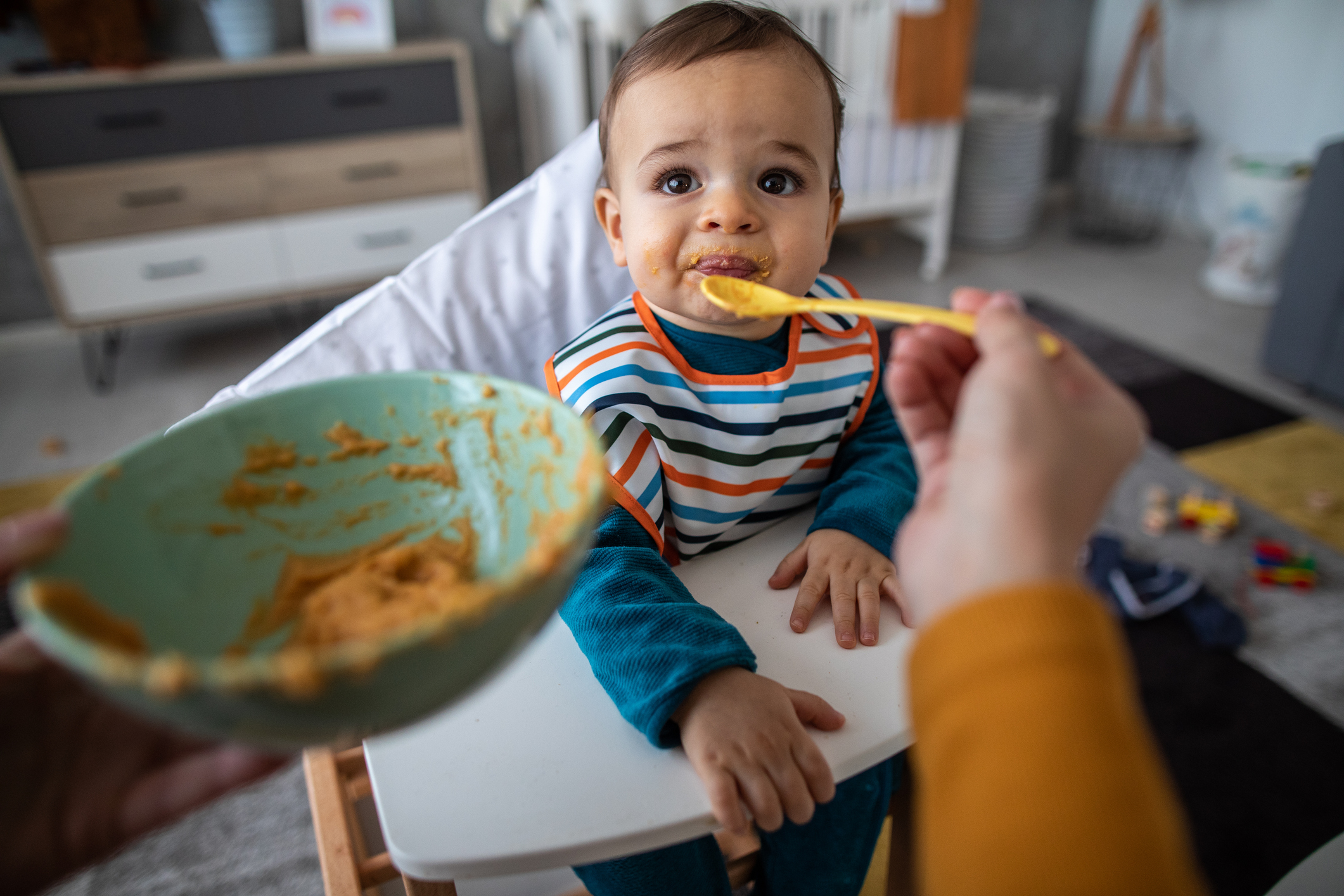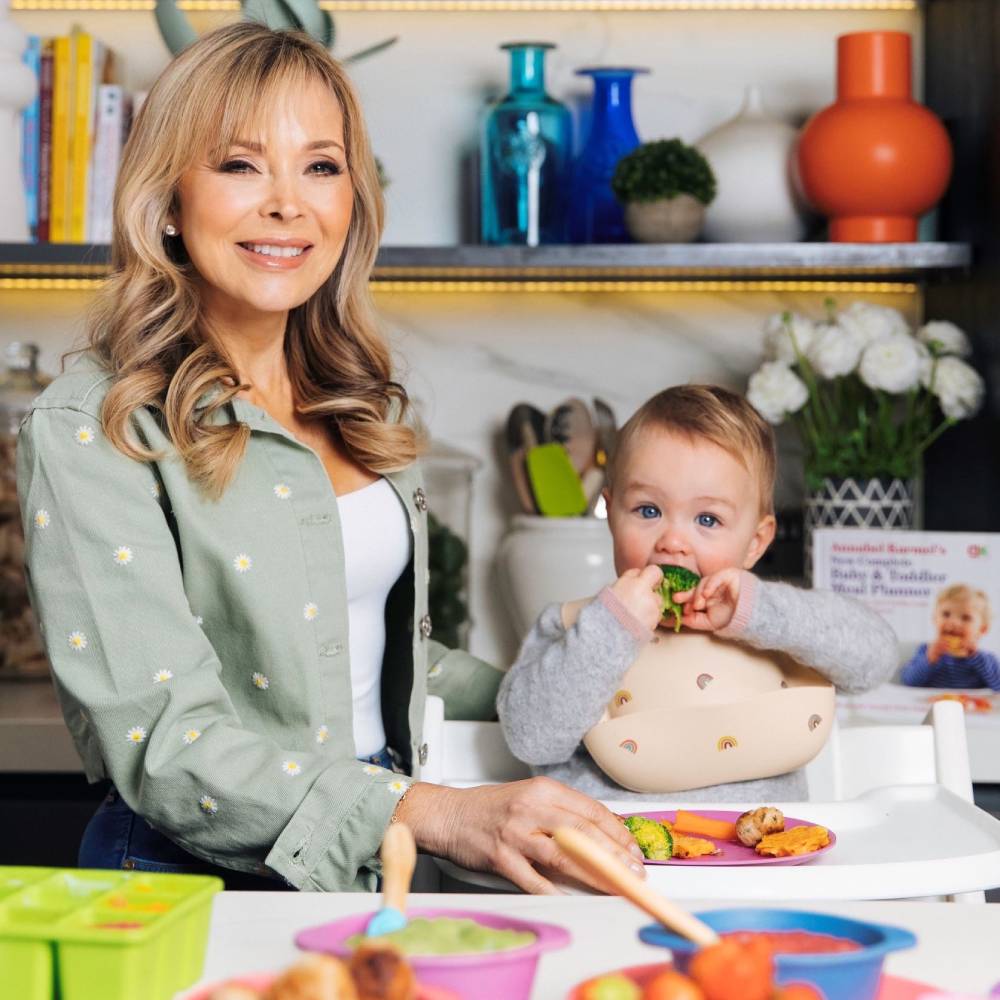'My baby gags on solid food' and 11 other common weaning worries Annabel Karmel, weaning expert, totally gets (and shares her top tips to put your mind at rest)
Annabel Karmel, an award-winning nutrition expert, shares her insights into weaning worries parents have when starting their weaning journey...

Annabel Karmel

Starting to wean your six-month-old can be a daunting task, especially when you've got lots of questions and concerns; be it gagging, allergies, messy eaters, or teething issues.
Whether you're looking to go down the baby led weaning avenue, or you're going to start your little one on baby foods and purees first, you are more than likely going to come up against a few hurdles (isn't that just parenting for you?) and deciding what to do about them can be a tad overwhelming.
Fortunately, Annabel Karmel, chef, nutrition expert, and best-selling cookbook author, has shared her expert advice and insights into our most common baby weaning worries, and how we can address them at home.
So if you're amid your baby weaning journey, you've only just begun or you're starting to do research ahead of time, here are some of Annabel Karmel's top tips on how to combat those common weaning worries you may come up against...
1. I’m worried my baby is going to be allergic to something
Allergies are a big concern for parents, but it may be reassuring to know that the incidence of food allergy in babies is low – about 3 - 6 per cent. It is recommended that potential allergenic foods, such as eggs or peanuts, should be introduced from six months.
In fact, for babies who don’t have parents or siblings with allergies, or who don’t have early-onset eczema, start introducing allergenic foods the same way you would with any other food. By introducing these foods into your baby’s diet early on, it may help prevent allergies from developing.
Consider introducing these potentially allergenic foods one at a time, with a gap of 48 hours between each new food. This makes it easier to identify any food that causes a reaction. If you have any concerns at all, don’t be afraid to check in with your GP or health visitor.
Parenting advice, hot topics, best buys and family finance tips delivered straight to your inbox.
2. My baby gags on solid food and it’s making me a nervous wreck
The transition from either milk or pureed foods to offering more textured foods is a big step in your little one’s development – and a milestone for you too! It’s unchartered weaning territory and one that understandably tends to spark concerns around gagging and choking.
It’s important to note that gagging is completely normal. This is simply nature’s way of protecting your baby’s airway and a natural response to new tastes or textures. At the beginning of weaning, your baby is learning how to use their tongue to move food from the front of their mouth to the back so they can swallow it. Getting to grips with this can lead to gagging, but they will soon get the hang of it, so try not to worry if your baby gags and spits out food.
Choking is when your baby’s airways become blocked. They will be unable to cry, cough, make any noise, or breathe and they’ll need immediate help. To minimise the chance of your baby choking on food, never give whole pieces of small solid foods, or raw fruit or vegetables that could easily lodge in and obstruct the throat. Make sure your baby is always supervised and in a supported upright position when eating. Lastly, babies do have a tendency to store food in their mouth, so just have a quick check before you take them out of the highchair!
It's worth familiarising yourself with first aid procedures for babies and children. Check out the Red Cross and NHS websites which have training videos. There may also be local sessions in your area.
3. Should I be worried if my baby is afraid to try new foods?
If giving new foods feels like a bit of an uphill battle, you are not alone. When they’ve only had milk for the first six months of their life, it’s not surprising that babies can be overwhelmed by all the new tastes and textures the world of food has to offer!
Whilst babies tend to enjoy sweeter veggies like carrots and butternut squash, it’s important to introduce them to a variety of flavours right from the get-go. It may take some perseverance, but research shows that introducing more bitter veggies, such as broccoli, alongside sweeter root vegetables from the very start helps babies to accept a variety of tastes, and they’ll likely be more adventurous with their food exploration later on.
Keep offering a variety of foods and textures, and go at your baby’s pace. It can take up to 15 attempts for your baby to accept new tastes, so keep experimenting.
4. My baby is a slow eater - is that ok?
Being a slow eater isn’t necessarily a bad thing. If your baby is relaxed and taking their time with their meals, it will encourage them to enjoy their food and allows their brain time to recognise when they are full. However, there might be a couple of reasons why your baby is taking longer than expected to munch through their meals.
It may be that your baby is not hungry enough to give their solid foods their full attention; be careful to time milk feeds so that you aren’t filling their tiny tummy right before offering solids. Try to remove distractions, such as toys, screens, and siblings if you think your baby is eating too slowly, so they can focus on their food.
5. Should I be worried if my baby is refusing to eat and keeps spitting out food?
There are endless reasons why your baby might be turning their nose up at food…they’re not hungry, they want to take charge, they don’t like something or they’re in a fractious mood. Things like overtiredness, being unwell, or teething can also impact their appetite.
Mealtimes with baby can be frustrating and disheartening at times, particularly when they’re not interested in the food you’ve spent time preparing. Believe me, I’ve been there myself. In fact, my entire first cookbook was based on my fussy-eating baby boy. However, if your baby picks up on your frustration, it will only escalate their negative behaviour. Just take a deep breath, stay calm, and let them take the lead – even if that means cutting that mealtime short as they are not interested
If your baby is showing signs of disliking a particular food, that’s ok. Leave it there and try again the next day or the day after. Just don’t strike it off your baby’s ‘like’ list straight away as they’ll need the opportunity to get to grips with it first.
6. Is it ok if my baby doesn’t like finger foods?
Finger foods are the ideal way to introduce your little one to different textures, and handing over the reins to your baby will allow them to work out how to get food to their mouth, break pieces off, and chew. It’s also a great opportunity to let them exercise their independence! The key is to let your baby to go at their own pace, and certainly start with soft finger foods.
For the first few weeks, offer a range of simple, soft vegetables and fruits. To get the most nutrients out of your vegetables, steam or roast them until soft, and cut them into the right size.
First finger foods should be cut up into pieces big enough for your baby to hold in their hand with a bit sticking out. As a rule of thumb, the pieces should be around the size of your finger. This reduces the risk of choking.
Very ripe fruit is naturally soft, making them some of the best finger foods on the baby block. Ripe bananas, peach, watermelon (remove the seeds), raspberries and mango are perfect to get your little one started.

7. My baby is refusing to take a cup
From six months you should offer your baby a cup of water with every meal (not before, as it could fill up those tiny tummies). It is recommended that babies start to learn to drink water from an open cup straight away so that they learn the art of sipping. No-spill valves and spouted drinking cups are generally not recommended for regular drinking because these require a different set of mouth actions.
Open cups are also widely agreed to be better for your teeth and avoid the need for further transitions from bottle, to spout, to open cup. As a little tip, you can buy small sloping cups, which your baby might find easier as they don’t have to tilt it so far to sip the water.
Don’t worry if your baby doesn’t drink too much at first, as they should be receiving most of their hydration from breast milk or formula until at least 12 months. Remember that getting used to the new taste and art of drinking from a cup is another skill they must master on their weaning journey!
8. I’m worried my baby isn’t eating enough
The early days of weaning are as much about learning and exploration as they are about eating. Milk will remain a primary source of nourishment. Having a routine around milk and solid foods will allow your baby to build up an appetite and know when to expect solid food to be offered. Let your baby be in the driving seat to decide how much to eat.
As long as your baby continues growing and putting on weight, there’s no need to worry. The important thing is to offer a variety of foods, of different tastes and textures. They will gradually increase their food intake over time. It’s also worth pointing out that a baby’s appetite varies from day to day so don’t worry if some days they don’t seem to have eaten very much.
If you are still feeling concerned speak to your GP or health visitor for reassurance and advice.
9. My baby is a messy eater - is that ok?
Little ones often make a mess when eating, but that’s ok! Babies are naturally inquisitive and exploring their food is an important part of their weaning journey. They can learn a lot from handling food; from finding out how to hold something without dropping it, to getting to grips with different shapes, sizes, weights, tastes, and textures. After all, taste is just one of the five senses that a baby will use when exploring food.
Allow your baby to make a little mess – babies learn through play, and that includes playing with their food! Just keep a flannel on hand for a swift wipe-down.
10. Will teething stop my baby from eating?
For most babies, their first teeth will make an appearance around the same time that they start their weaning journey. Teething can be a difficult obstacle when your baby is exploring solid foods – if your baby’s gums are sore, and they are feeling a little under the weather, it’s no surprise that they may prefer the comfort of their usual milk.
While some foods can make eating tricky for sore gums, there are others that can help soothe these symptoms. Try cold foods, like cucumber sticks or a chilled puree, or make frozen yoghurt melts by blending some pureed fruit with yoghurt and freezing the mixture in spoonfuls for a cool snack to soothe those gums.
11. Should I be worried if my baby has tummy troubles after eating solids?
In those first weeks of weaning, your baby’s body will be working hard to get used to new foods, and this can have an impact on their bowel movements. In most cases this is a temporary adjustment, however, if you think your baby is unwell for whatever reason, trust your instinct and see your GP or health visitor.
With both diarrhea and constipation, the most important step is ensuring your baby stays hydrated, even if they don’t have much of an appetite or seem very thirsty. Offer regular sips of water in between their usual feeds and more frequent milk feeds.
Diarrhea and constipation can also be symptoms of a delayed allergic reaction, which can develop between 2 – 48 hours after consumption. Monitor symptoms closely, and speak to your GP or health visitor if you have any concerns.
12. I’m worried my baby isn’t getting enough nutrients
As your baby approaches the six-month mark, they’ll be going through an amazing growth spurt. Here’s a fact for you; in their first year, babies triple their birth weight. And obviously, to grow that much, they’ll need a stack of nutrients! It’s important to introduce foods containing critical nutrients, like protein, iron, and omega-3 essential fatty acids fairly quickly. Offer fruit and veg for the first couple of weeks and then start introducing protein-rich foods like red meat, eggs, and lentils and oily fish such as salmon.
One of the most vital nutrients for your baby is iron, which supports their growth and immune system. Full-term babies are born with a reserve of iron and, until six months, your baby will have been busy using the store of iron they’ve inherited from mum. But it’ll be getting a bit lower by this point, which is why around six months is the ideal time to start introducing iron-rich foods into your baby’s diet.
There are two types of iron; haem iron, which is found in meat and fish and is easily absorbed by the body, and non-haem iron, which is found in eggs and plant-based foods, and is less easily absorbed. Vitamin C can aid the absorption of iron, so pair plant-based foods with something high in vitamin C (such as a small portion of fresh fruit or raw vegetables) to ensure your baby’s body is taking in that all-important iron.

Annabel Karmel MBE is a chef and author of over 40 cookbooks based on nutrition, and cooking for babies, children and families. With her career spanning over 25 years she has pioneered the way families feed their babies and children all the world over. Her love of cooking developed while spending time in Holland where her mother would send her recipes to keep her occupied. This quickly became an adored hobby and way to relax. She turned to children and family nutrition with her first cookbook ‘The complete Baby and Toddler Meal Planner’ in 1991 as a legacy to her first child Natasha who sadly passed away when she was just 3 months old from a viral infection. In 2006 Annabel was awarded an MBE for her outstanding work in the field of child nutrition, and she has since become recognised as one of the UK’s leading female entrepreneurs.
Looking for mealtime inspiration for your baby or toddler? Annabel’s award-winning recipe app is packed with over 1000 simple and delicious ideas, PLUS new recipes every week. Packed with expert weaning support, including Annabel’s #1 listen-along guide, it’s a kitchen essential for happy, healthy mealtimes. Visit the App Store or Google Play and start your FREE trial today!
For those of you looking for more information on baby led weaning - we have everything from baby led weaning foods and baby led weaning recipes, as well as the best way to get started with baby led weaning.

Jessica Dady is Food Editor at GoodtoKnow and has over 12 years of experience as a digital editor, specialising in all things food, recipes, and SEO. From the must-buy seasonal food hampers and advent calendars for Christmas to the family-friendly air fryers that’ll make dinner time a breeze, Jessica loves trying and testing various food products to find the best of the best for the busy parents among us. Over the years of working with GoodtoKnow, Jessica has had the privilege of working alongside Future’s Test Kitchen to create exclusive videos - as well as writing, testing, and shooting her own recipes. When she’s not embracing the great outdoors with her family at the weekends, Jessica enjoys baking up a storm in the kitchen with her favourite bakes being chocolate chip cookies, cupcakes, and a tray of gooey chocolate brownies.
- Annabel KarmelContributor
